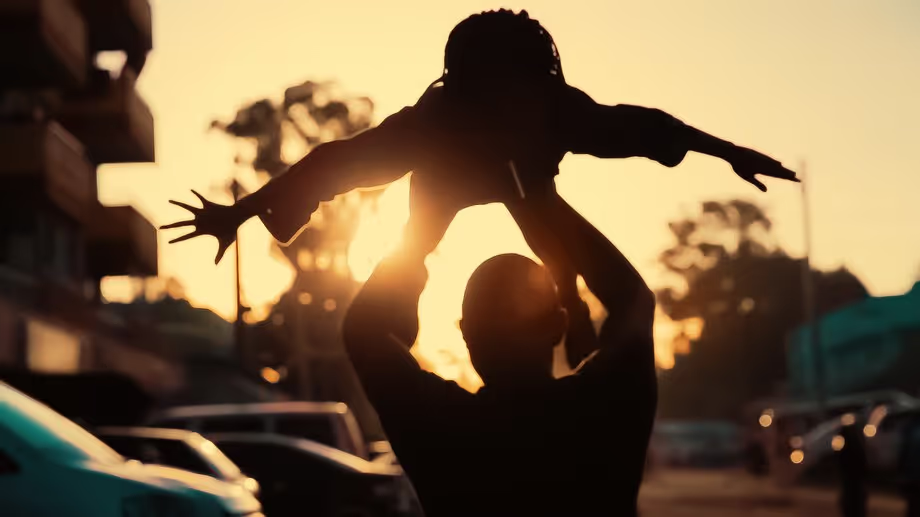Identity, Citizenship, and Nationalism: At Home and Abroad Film Clips
Film Clips

Clip 1: The Benefits of Citizenship (7:34 - 13:00, length: 5:26 minutes)
This clip opens with Boniface’s daughter asking, “Where are you going?” and ends with Njeri recalling her husband’s astonishment on their wedding day at having survived years of political activism.
This clip offers insight into the perceived and actual benefits of being a citizen of Kenya juxtaposed with the tenants of citizenship in the United States. Drawing from the old adage “A picture is worth a thousand words”, photojournalism is used to explore the mutually reciprocal responsibilities of each party in this civic relationship, as well as expound the myriad ways tribal or ethnic differences influence peoples’ experiences of citizenship on shared land.
Clip 2: The Identity of a Country (13:38 - 17:48, length: 4:10 minutes)
In the beginning of the clip, Boniface explains his and Njeri’s decision to not name their children after local tribes. At the end, we hear a crowd of protestors chanting, “No more killings.”
The clip traces the history of British colonialism in Kenya built on the exploitation of and divisions created between tribes. Following the country’s independence in 1963, these divisions were leveraged by the country’s second president, President Uhuru Kenyatta, who was investigated by the International Criminal Court for inciting post-election violence amongst tribes. However, the investigation was curtailed by the disappearance of key witnesses, leading to protests amongst the people of Kenya.
Clip 3: Give Me Liberty or Give Me Death (38:04 - 41:18, length: 3:14 minutes)
This clip begins with one of Boniface’s children announcing his book launch and ends with Njeri expressing her renewed vigilance upon her family’s death threat.
“I know not what course others may face but as for me, give me liberty or give me death.” (Patrick Henry).
In the face of unexplained deaths and governmental indifference, this clip lays the groundwork for students to discuss the idea of risking one’s life for one’s allegiance to their country. What are the dangers associated with speaking up for what is right in political settings? How does this safety impact the family members of those involved in political campaigns? How important is Boniface’s support system to not only him but to the movement? What do we do with bottled-up expressions? How do we face death?
Clip 4: Runaway Love/Who Runs The World (41:20 - 47:37, length: 6:17 minutes)
The clip opens with a voiceover from Njeri in which she describes her fear for her family’s safety and ends with her singing to her husband over video chat.
What do we as a nation owe political refugees like Njeri and Boniface and their children when they arrive on our soil seeking asylum? What kind of reputation do politicians have where undocumented immigrants are concerned? How much do we know about the lives and stories of refugees around the world? Who runs the world? How crucial are Black women to political campaigning and winning both in Kenya and the United States? For instance, many parallels can be made between the grassroots funding and organizing of Boniface and President Barack Obama’s campaigns.
Clip 5: Family Matters (52:52 - 56:10, length: 3:18 minutes)
This clip begins with one of Boniface’s sons reading the Father’s Day card he addressed to his mother. It closes with Boniface, having read one of Njeri’s letters from the U.S., saying he understands why his wife is reluctant to return to Kenya.
In this clip, viewers explore the impact of long-term separation on maintaining healthy family bonds between husband and wife and father and children (i.e. Boniface’s son’s Father’s Day card written to his mother). What can we infer about how Boniface’s son is processing their familial separation? What is it like to have letter writing as the primary means of communication between loved ones as opposed to human interactions?
Clip 6: The Women (57:45 - 1:04:48, length: 7:03 minutes)
At the beginning of the clip, Njeri watches an interview with Boniface who discusses her role in his political campaign. At the end, Njeri comforts one of her children by saying, “Being here for daddy means you don’t cry.”
This clip largely depicts the assumptions surrounding Black women who are solely seen as strong and void of other feelings naturally ascribed to other women (tender, soft, sensitive, delicate, etc.) How do we socialize girls and women to “support their man”? How many women sacrifice their lives and livelihoods to support their husband’s aspirations?

